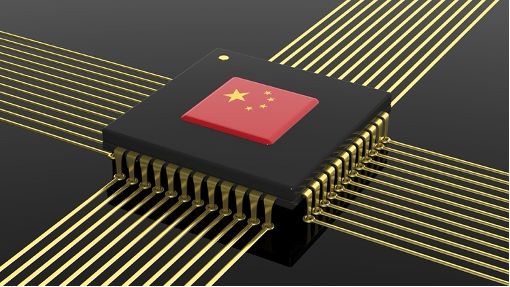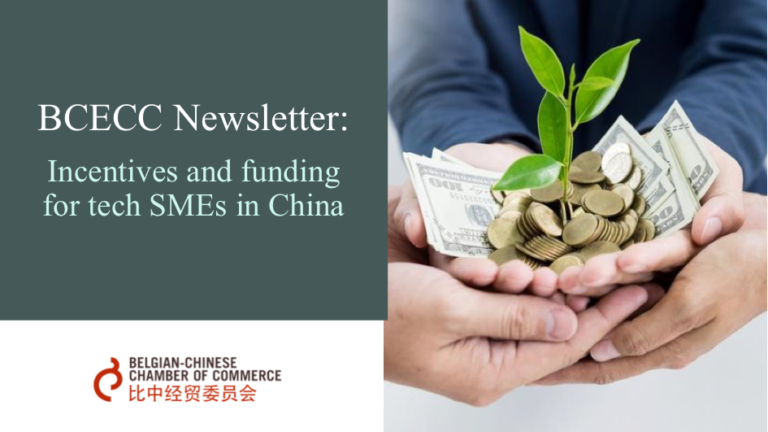When planning to enter China, many Belgian companies wonder whether it is possible to get any incentives or subsidies in China. Recently, the EU SME Centre published an extensive report about this topic. In this article we present a summary, but more details can be found in the EU SME Centre’s report, freely accessible by EU SMEs and business organisations at https://www.eusmecentre.org.cn. A recording of the recent webinar can also be found at the following link: https://www.youtube.com/watch?v=kedkAd ZCrg
First, it is to be noted that most funding opportunities in China focus on sectors which are listed in the Catalogue of Encouraged Industries for Foreign Investment (also referring to the 14th Five-Year Plan). Furthermore, these instruments are largely targeted at tech companies with a legal entity in China. Although most government incentives and funding instruments in China are obtained by Chinese companies, they are also open to foreign-invested companies, both joint ventures with a Chinese partner, as well as wholly foreign-owned enterprises (WFOE). And finally, these incentives are available for SMEs, but also for large multinational companies.

There are basically five types of incentives: (1) market entry incentives, (2) status recognition benefits, (3) subsidies and rewards, (4) research grants and (5) innovation vouchers. Local governments in China (at provincial, municipal or even district level) have quite some freedom and flexibility in granting subsidies to new foreign companies and entrepreneurs settling down in their jurisdictions. Often, they even compete against each other to attract innovative actors, which can offer interesting opportunities for foreign investors.

Market entry incentives can be one-off awards, a percentage of the investment, as well as corporate income tax exemptions and rent subsidies. There are also thousands of incubators or accelerators in China that offer all-round ‘soft landing’ support to newcomers in China, sometimes even offering them free office space for a certain period. However, only a small number of accelerators are acquainted with hosting and working with international entrepreneurs.
Status recognition benefits are granted to tech-based SMEs with ownership of intellectual properties in China, demonstrating strong R&D commitment and operating in key priority technology areas. The benefits to be received are deductions of the corporate income tax from 25% to 15%, cash rewards, 175% amortization of R&D expenses and stronger support for the application of other government incentives and grants, as well as loans from local banks.
Subsidies and rewards exist for basically any type of innovation activity. Some examples of this are subsidies for R&D investments, technology transfer projects, new patents filing, industrial transformation and technological upgrading projects. These incentives are offered after the launch or completion of the specific project for which the subsidy is applied. Typically, the subsidies are granted annually, based on the total amount or intensity of R&D expenses conducted by the company in the previous year.

Research grants are offered for research and innovation activities and are usually targeted at projects with universities and research institutes. Local departments of science & technology publish application calls on their websites, after which interested parties can submit their applications. Grants are generally paid in two instalments: the first instalment upon signing of the contract and the second one after the final acceptance of the project deliverables. There are also international S&T cooperation joint projects between Chinese companies or organisations and foreign partners without a legal entity in China.
The last type of incentives are innovation vouchers. These consist of small lines of credit granted to tech-SMEs and entrepreneurs to purchase, at discounted rates, specific services provided by a series of local providers. The value of these vouchers is not particularly high and generally only covers a proportion of the costs of the service purchased, and there are also annual caps for each company.
It is important for Belgian tech SMEs to be aware of these funding opportunities in China, as these could represent a good source of revenue for the SME. However, it could be a complicated process to find the relevant incentives for your project and follow the procedures and deadlines. Furthermore, there are frequent changes in policies, new programmes are introduced on a regular basis, which could also be quite different in various regions and cities. It is therefore advisable to allocate dedicated resources and personnel (either in-house or external consultants) to look for suitable funding opportunities for your company in China.
Source: EU SME Centre
For more information and assistance in doing business with China in 2022, please contact us or follow the official WeChat account of the Belgian-Chinese Chamber of Commerce (BCECC).
